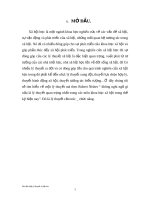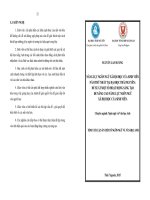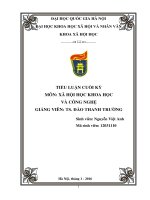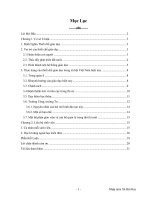TIỂU LUẬN NGÔN NGỮ XÃ HỘI HỌC
Bạn đang xem bản rút gọn của tài liệu. Xem và tải ngay bản đầy đủ của tài liệu tại đây (196.42 KB, 9 trang )
HUE UNIVERSITY
INSTITUTE OF OPEN EDUCATION
AND INFORMATION TECHNOLOGY
ENGLISH LANGUAGE
--------o0o--------
SOCIOLINGUISTIC PROJECT
Lecturer:
Trần Thuần
Student’s name:
Hoàng Thị Hương Giang
Student’s code:
7052900503
Class:
Nghe An 6
Topic 1:
1. There are systematic differences between the English spoken in the
US and the English spoken in the UK, hence the terms ‘American English’
and ‘British English’ due to historical and political reasons.
It is highly plausible that a similar phenomenon, historically and politically
triggered, can be found in the Korean language. Investigate the (possible)
differences between the Korean spoken in North Korea (Democratic People’s
Republic Korea) and the Korean spoken in South Korea (Republic of Korea).
Nghe An, July 2023
I – INTRODUTION
English, spoken in both the US and the UK, evolved over hundreds of years
from Old English. Funny enough, Old English is primarily incomprehensible
with to its contemporary counterpart, modern English.
Oscar Wilde famously stated, "We truly have everything in common with
America today, except, of course, the language." This quote shows how
English in the US and the UK differ. If the origin of the languages they spoke
was the same, how did they become different?
The main reason these two countries' English is different is how the language
has changed over time. At one point, they both spoke English the same way.
American English owes much to the original 13 colonies by British
immigrants in the late 17th century.
In terms of speech, the differences between American and British English
actually took place after the first settlers arrived in America. These groups of
people spoke using what was called rhotic speech, where the ‘r’ sounds of
words are pronounced. Meanwhile, the higher classes in the UK wanted to
distinguish the way they spoke from the common masses by softening their
pronunciation of the ‘r’ sounds. Since the elite even back then were
considered the standard for being fashionable, other people began to copy
their speech, until it eventually became the common way of speaking in the
south of England.
II - DIFFERENCE
2.1 Phonological difference
A language cannot be studied without alluding to its sounds and
pronunciation, that is to say the study of Phonology. Indeed this linguistic
field is essential to study the different dialects.
Defined as the study of sounds patterning in a language, at one extreme
Phonology focuses on anatomy and physiology or the organs of speech and
how we learn to use them and from an-other extent, it shades into
Sociolinguistics as we consider social attitudes to intonation and accent. This
latter refers to the way people pronounce when they speak and it is various
be-cause the way people speak is unique and personal to everyone. It even
changes at the indi-vidual level as people adapt to different situation they use
sounds consistently to different contexts.
Nevertheless, some identifiable groups of people living in the same
geographical area or hav-ing the same social features share a collection of
sounds in the language they speak that is ex-clusively scattered in their social
group or location. In other words, they have a particular ac-cent (a way of
pronouncing) which is unique and different from the varieties of accents in
the given language. In effect, several accents can be noticed as far as British
and American Eng-lishes are concerned, identifying them may be complex
due to their diversity besides even within in a single country different
segments of the population may exhibit different behav-iors.
In what follows, are some phonological features that definitely distinguish
speakers from the United Kingdom and those from the United States.
2.2Rhotic accent
Rhoticity concerns the deletion or the pronunciation of the consonant [r]
depending on the English dialect. The presence of rhotic accent is one of the
most noticeable differences between the British and the American English.
For American English is rhotic1 except for New York City and the area of
Boston, while the British English is non-rhotic2, save for Scotland and
Ireland.
Let us describe now how the prevocalic sound /r/ is produced or dropped
depending on accents.
As far as rhotic accent is concerned, the tongue approaches the gum and the
tip is curled back towards the roof of the mouth. The pronunciation of sound /
r/ behaves in different ways such as:
- The alveolar approximant [ɹ]. Sound [ɹ] appears at prevocalic
positions in a syllable or syllable-clusters.
Example 1: as in red [ɹed], camera [ˈkæməɹə], train [tɹeɪn],
confrontation [ˈkɑ:nfɹənˈteɪʃn], or program [ˈpɹoʊgɹæm].
- The alveolar flap [ɾ]. In American English, very often in colloquial
registers, sound [ɹ] at intervocalic position with the stress on the first
vowel is substituted by [ɾ],
Example 2: in words like parish [ˈpæɾɪʃ], or lurid [ˈlʊɾɪd].
However, camera is pronounced as [ˈkæməɹə] because the vowel
before letter r is not stressed. The alveolar flap [ɾ] only occurs in
American English, while the alveolar approximant [ɹ] is found in both
accents.
- Intrusive R: the insertion of an epenthetic r between vowels when the
first vowel is one that can occur before syllable final /r/. An epenthetic /
1
2
The pronunciation of the orthographic r
The deletion of the orthographic r in pronunciation
r/ at word boundaries is intruded especially where one or both vowels
are schwa.
2.3 Differences in vowel pronunciation
There are many paradigms showing the differences in vowel pronunciation
between British English and American English.
Change of Diphthong [əʊ] to [oʊ]: The shift from the British diphthong [əʊ]
to [oʊ]. The shift consisted in the change of the mid central unrounded vowel
[ə] to the close-mid back rounded vowel [o] in the first vowel of the
diphthong. This shift is considered systematic. In Table 1, several examples
of this shift are shown.
WORD
RP
GA
No
[nəʊ]
[noʊ]
Go
[ɡəʊ]
[ɡoʊ]
Crow
[krəʊ]
[kroʊ]
Cocoa
[kəʊ.kəʊ]
[koʊ.koʊ]
Component
[kəmˈpəʊ.nənt] [kəmˈpoʊ.nənt]
Promotion
[prəˈməʊ.ʃən]
[prəˈmoʊ.ʃən]
Romantic
[rəʊˈmæn.tɪk]
[rəˈmæn.tɪk]
Change of Vowel [ɒ]: the sound /o/ is pronounced in many different ways in
English.
Example 3: Hot [hɒt] in RP, but [hɑ:t] in GA; love[lʌv]; corn
[kɔ:n] in RP, but [kɔ:rn] in GA; continue[kənˈtɪnju:]; moon[mu:n];
coast[kəʊst] in RP, but [koʊst] in GA; house[haʊs]. The so-called “short o”,
which often appears in a stressed syllable with one letter o such as in dog or
model, underwent a change in American English. In British English that
sound is pronounced as an open back rounded short sound [ɒ], as in hot [hɒt],
or possible [ˈpɒsəbl]. In American English it is pronounced either as an open
back unrounded long sound [ɑ:], as in hot [hɑ:t], or as an open-mid back
rounded long vowel [ɔ:], as in dog [dɔ:g]. Note that British English prefers a
short sound as opposed to American English, which prefers a long sound in
all cases. Table 2 shows several words in both pronunciations.
WORD
BRTISH ENGISH
AMERICAN
Box
Chocolate
Clock
Cost
Dog
Gone
Got
Hot
Job
Lot
Not
Off
Possible
Sorry
Stop
Want
[bɒks]
[ˈtʃɒk.lət]
[klɒk]
[kɒst]
[dɒɡ]
[ɡɒn]
[ɡɒt]
[hɒt]
[dʒɒb]
[lɒt]
[nɒt]
[ɒf]
[pɒs.ə.bl̩ ]
[ˈsɒr.i]
[stɒp]
[want]
ENGLISH
[bɑːks]
[ˈtʃɑːk.lət]
[klɑːk]
[kɑːst]
[dɑːɡ]
[ɡɑːn]
[ɡɑːt]
[hɑːt]
[dʒɑːb]
[lɑːt]
[nɑːt]
[ɑːf]
[pɑːs.ə.bl̩ ]
[ˈsɔːr.i]
[stɑːp]
[wɑːnt]
In the areas of Eastern New England, such as the Boston accent, and New
York City this change did not take place. This is coherent with the same
theory explaining why speakers of those areas are non-rhotic (C.Wells, 2000).
Changes to [oʊ] and [ʌ]: the most frequent changes are from [ɒ] to [ɑ:] and
[ɔ:]. However, in a very few cases the vowel [ɒ] is changed to [oʊ] and [ʌ].
-Change to [oʊ]: Example 4: compost is [ˈkɒmpɒst] in RP, but in GA it is
[ˈkɑ:mpoʊst].-- ---Change to [ʌ] : Example 13: hovel; hover.
Change of [æ]: Around the American Revolutionary War vowel [æ] started
to undergo a change in Southern English, the future seed of RP. This nearopen front unrounded vowel [æ] is first lengthened to [æ:] and later lowered
to the open back unrounded vowel [ɑ:]. However, the change did not take off
in GA, bringing about a new difference between both accents.
The change of vowel occurs under certain conditions, but it is deemed
inconsistent, as we will see in the examples below. Vowel [æ] becomes vowel
[ɑ:] in RP when:
Vowel [æ] is before sounds [s], [f], and [ɵ], as in pass, calf, and path.
Vowel [æ] is followed by another consonant, especially in the cases
such as [ns], [nt], [nʧ], and [mpl], as in dance, can’t, ranch and sample
NB: The changes are not applied before other consonants, as in cat, pal, cab,
and drag.
Here we give some examples to illustrate the above rules as well as a few
exceptions:
Examples 5: words pronounced with [æf] in GA with [ɑ:f] in
RP:calf, graph, giraffe, half, laugh, staff, after, craft, daft, draft,
laughter, raft, shaft.
2.4 Grammatical difference
What is referred to as grammatical variation really involves two
sub-types: morphology and syntax. Morphology refers to the
structure or form of words, including the morphemes or minimal
units of meaning which comprise words for instance the morphemes
{un}"not" and {kind} "kind" in unkind, or the morphemes
{dog}"dog"
and
{s}
"plural"
in
dogs.
Syntax refers to the structure of larger units like phrases and
sentences, including rules for combining and relating words in
sentences, for instance the rule that in English yes/no questions,
auxiliaries must occur at the beginning of sentences, before the
subject noun phrase (e.g. Can Mary go? versus the statement Mary
can go).
Actually, one can find examples of variation in both types as far as
American and British is concerned.
First, there are landmark morphologic features showing the
differences between these two dialects.
2.2.1 Verbs morphology:
- One of the difference at this level is the use of past tense and past
participle of certain verbs such as spoil, spell, burn, dream, smell,
spill, leap, and others. These verbs that can be regular or irregular
have a various use in the American and in British English. In fact, in
BrE both regular and irregular forms are current except from some
verbs (such as smelt and leapt). There is a strong tendency towards
the irregular forms, especially by users of Received Pronunciation.
For other words (such as dreamed, leaned and learned), the regular
is somewhat more common. In most accents of AmE, the irregular
forms are never or rarely used (except for burnt).
The t endings may be encountered frequently in older American
texts, especially poetry. There may be a various usage when the past
participles are used as adjectives, as in burnt toast or as in the twosyllable form learned, (an adjective used to mean "educated" or to
refer to academic institutions both in BrE and AmE.) Finally, the
past tense and past participle of dwell and kneel are more commonly
dwelt and knelt in both standards, with dwelled and kneeled as
common variants in the US but not in the UK.
- Lit as the past tense of light is more common than lighted in the
UK. Americans use lit to mean ‘set afire’ or ‘to emit light’ but
lighted to mean ‘to cast light upon’
Example 6: "The stagehand lighted the set and then lit a cigarette."
Conversely, BrE favors fitted as the past tense of fit generally,
whereas the preference of American English is more complex.
- The past tense of spit "expectorate" is spat in BrE, spit or spat in
AmE. AmE typically has spat in figurative contexts, for example,
"He spat out the name with a sneer", or in the context of
expectoration of an object that is not saliva. Example 7: "He spat
out the foul-tasting fish" but spit for "expectorated" when it refers
only to the expulsion of phlegm or saliva.
- The past participle gotten is never used in modern BrE (apart from
in dialects that retain the older form), which generally uses got,
except in old expressions such as ill-gotten gains. According to the
Compact Oxford English Dictionary3, "The form gotten is not used
3
The main historical dictionary of the English language, published by the Oxford University Press.
in British English but is very common in North American English."
The American dictionary Merriam-Webster, however, lists "gotten"
as a standard past participle of "get." In AmE gotten emphasizes the
action of acquiring and got tends to indicate simple possession (for
example, Have you gotten it? versus Have you got it?). Gotten is
also typically used in AmE as the past participle for phrasal verbs
using get, such as get off, get on, get into, get up, and get around: If
you hadn't gotten up so late, you might not have gotten into this
mess. AmE, but not BrE, has forgot as a less common alternative to
forgotten for the past participle of forget.
- Another special case concerns the AmE usage of the verb slay,
which has two past tenses, the choice depending on the meaning:
when slay means ‘to kill violently’ its past tense form is slew, but in
its figurative sense, ‘to delight or to amuse immensely’, the regular
form slayed is usually chosen.
Example 8: He slayed the audience or that slayed me meaning
‘caused me to laugh vigorously’
CONCLUSION
The main goals of dialectology are to describe the component
varieties of a language and discover the different boundaries
between dialect regions or social stratifications.
It is undeniable that English shows internal variations, like all
languages, that is to say it is made of a number of varieties and is in
one sense the sum of those varieties. As English is more and more
gaining ground around the world, its dialects are widely increasing.
Since the United States and the United Kingdom do not exactly
share the same cultures regardless of speaking the same language,
consequently several versions of English are retrieved in both
countries. These varieties explains the differences in spelling,
pronunciation, words that differ in terms of stress as well as
vocabulary etc.
English, a language originating from England has undoubtedly well
spread in the American continent ever since its discovery. Because
of massive immigrations of English people who came and settle in
the New World, English has become the dominant language
everywhere in America. However, one could say that, thanks to the
media, technology and the power of the United States in the world,
American English has been standardized and emerged to influence
even British English. For this reason many American terms has
ousted the British one as in the case of radio for wireless; the
ubiquitous use of okay. As well as the notable use of derivational
suffixes in this respect: -ster: gangster, oldster; -ician: beautician,
cosmetician; -ee: escapee, returnee; -ette: roomette; drum majorette;
-ite: socialite, sub-urbanite; -ize; to winterize, to itemize, to
fictionalize.









